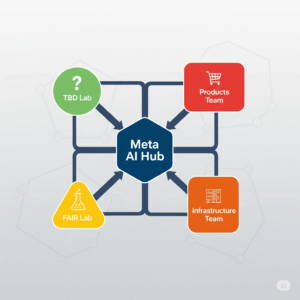Meta Platforms (NASDAQ: META) is undergoing its fourth AI restructuring in just six months, according to a report by The Information. The move underscores CEO Mark Zuckerberg’s aggressive push to accelerate the company’s artificial intelligence ambitions despite rising costs, staff turnover, and challenges in the race for artificial general intelligence (AGI).
Meta AI Restructuring Under Superintelligence Labs
The latest overhaul will divide Meta’s new AI division, Superintelligence Labs, into four specialized groups:
-
TBD Lab – A yet-to-be-defined unit with experimental goals.
-
Products Team – Including Meta’s AI assistant and consumer-facing tools.
-
Infrastructure Team – Dedicated to scaling systems and supporting data operations.
-
Fundamental AI Research (FAIR) Lab – Continuing Meta’s long-term research in advanced AI.
The restructuring comes after internal friction, high-profile staff departures, and lukewarm reception for Meta’s latest open-source Llama 4 model. While Meta did not immediately comment on the report, industry insiders see the changes as part of a broader effort to strengthen its competitive edge against rivals like OpenAI, Google DeepMind, and Anthropic.
Zuckerberg’s Bold Push for Artificial General Intelligence
Mark Zuckerberg has made it clear: Meta is going all-in on AGI development. AGI—artificial intelligence systems capable of outperforming humans in problem-solving and reasoning—is now central to the company’s long-term strategy.
During Meta’s July earnings call, Zuckerberg stated that the company will invest “hundreds of billions of dollars” into AI infrastructure, including the construction of massive new data centers. These facilities will support not just large language models like Llama, but also next-generation AI assistants and experimental AGI projects.
Financing Meta’s AI Restructuring and Expansion
To fund this ambitious vision, Meta has partnered with U.S. bond giant PIMCO and asset manager Blue Owl Capital to raise $29 billion for its new data center project in rural Louisiana.
The company also raised the lower end of its capital expenditure forecast by $2 billion, now expecting to spend between $66 billion and $72 billion in 2025. These funds will primarily go toward AI research, infrastructure, and staffing costs.
However, this investment spree comes with challenges. Rising employee compensation—driven by Meta’s aggressive recruitment of top AI researchers with lucrative salaries—will push the 2026 expense growth rate above 2025 levels.
Challenges in Meta AI Restructuring
Despite the enthusiasm, Meta’s restructuring reflects deeper struggles. Industry analysts point out:
-
Talent Retention: Several senior AI leaders have left the company in recent months.
-
Product Reception: The Llama 4 model received mixed feedback, raising questions about Meta’s ability to compete with rivals’ offerings.
-
Escalating Costs: Massive spending on infrastructure and compensation could pressure profits in the near term.
Still, Zuckerberg believes bold bets on AI will pay off. He has argued that Meta’s combination of large-scale platforms, advanced research teams, and data infrastructure gives it an edge in the AGI race.
The Bigger Picture: Silicon Valley’s AI Arms Race
Meta’s restructuring reflects a broader trend in Silicon Valley, where major players are racing to dominate the next era of AI. OpenAI, Google, Amazon, and Anthropic are all scaling research, cloud partnerships, and infrastructure spending at record levels.
For Meta, the challenge is balancing short-term investor concerns with the long-term payoff of AGI breakthroughs. While the repeated Meta AI restructuring may signal internal instability, it also demonstrates the company’s willingness to adapt quickly in an evolving landscape.
Conclusion
Meta’s fourth AI restructuring in six months underscores both the urgency and the uncertainty of its AI ambitions. With Superintelligence Labs now divided into four focused groups, Zuckerberg is betting heavily on AI to redefine Meta’s future. Whether this strategy will establish Meta as a leader in AGI or strain its financials remains to be seen.
🚀 For deeper insights on how AI reshaping industries connects with global business trends, explore IMPAAKT, the top business magazine driving conversations on innovation.














